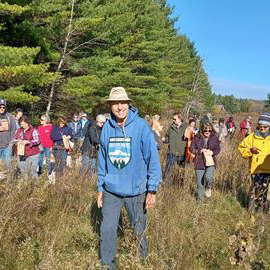Sturgeon Bay, Wis. (October 31, 2022) – This week at Crossroads, it’s all about collecting and/or dispersing seeds. The Wild Ones of the Door Peninsula, the Door County Master Gardeners Association and the Door County Seed Library are teaming up with Crossroads to offer a Seed Collecting Day on Saturday, November 5, at 11:00 a.m., but seed collection and dispersal are peaking in nature as well.
Once plants have been pollenated, they produce seeds. While some seeds are dispersed by wind, many plants depend on animals to move seeds from the parent plant to a place where they have a chance of growing.
Think of fruits and berries. A fruit is a seed-bearing structure of a flowering plant. Usually sweet, fleshy, and often colorful, fruit is an important food source for some mammals and birds. It’s fun to watch a flock of robins or waxwings descend on a tree and gulp down the fruit, which they eat whole, then fly away. When they defecate, the seeds are planted (with a little portion of nitrogen fertilizer) sometimes far from the parent plant.
Throughout the growing season, but frantically in late fall, squirrels and mice are gathering and caching nuts and seeds. True, they will eat most, but not all, of those seeds. Some will germinate. For example, little acorns grow into majestic oak trees, though curiously, many of the oaks are planted not by squirrels, but by birds such as blue jays.
And speaking of birds, summer and fall-blooming flowers benefit from migrating songbirds and winter residents Most native wildflowers produce huge quantities of tiny seeds, many of which just drop to the ground. But we often see little birds clinging to flower stalks to glean the seeds. Some seeds are spread in droppings, but many more are spread when, during feeding, birds accidentally dislodge seeds. We owe many wildflowers to the fact the wild birds and small rodents are messy eaters.
But the seeds which fall to the ground will not start growing right away. In our climate, seeds have a number of l adaptations which prevent them from sprouting during late fall or during unseasonable warm spells in winter.
Most of our wildflowers require a significant period of cold before they germinate. And that is one of the reasons Crossroads and our partnering organizations hold our Seed Collecting event. There is more to collecting wildflower seeds than just going out gathering them. And it’s complicated. Different plant species require different treatments in winter. Perhaps the biggest mistake made by most novice seed savers is storing their seeds in their warm cozy homes over the winter.
One of the benefits of attending the Seed Collection workshop at the Collins Learning Center is that the Door County Seed Library has prepared a wonderful booklet showing the appearance of blooming flowers and their seedheads. It gives directions on how to store and then germinate the native plants. The Seed Library also will distribute free seeds with directions printed on the packets. Volunteers from Door County Master Gardeners Association will demonstrate how to start plants using the winter sowing method. Members of Wild Ones will be on hand to help identify native species. The program is free and open to the public.
Crossroads is starting a lecture series we will call the Bird Club. At this time, there is no formalized organization. But the first Tuesday of each month we will offer a program about birds, and, if there is enough interest, we will perhaps develop a formal club.
Most people would be surprised how the diet of birds changes from season to season, so knowing what a bird eats and in what habitat it finds its food can really improve a bird-watching experience. We will initiate the Bird Club series with the lecture, “Birding by Habitat,” on Tuesday, November1, at 6:30 p.m.
Tuesday evening, November 8, at 7:00 pm, the Door Peninsula Astronomical Society invites the public to their November meeting at which Steve Ransom-Jones (one of our favorite presenters) will offer “James Webb – The Science and the Stories Behind the Images.” Visitors are encouraged to attend the meetings held at the Stonecipher Astronomy Center at 2200 Utah Street in Sturgeon Bay.
Crossroads at Big Creek Learning Center and Nature Preserve is located at 2041 Michigan. Crossroads is a 501(c)3 organization committed to offering education, conducting research and restoration, and providing outdoor experiences to inspire environmental stewardship in learners of all ages and from all backgrounds. We welcome your support! Become a member of Crossroads by mailing a contribution



 ALL CONTENT © 2024 BY DOOR GUIDE PUBLISHING
ALL CONTENT © 2024 BY DOOR GUIDE PUBLISHING




